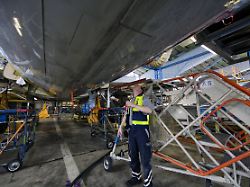After three declines in a row
Industry’s backlog of orders is increasing again
8/18/2023 9:32 am
Aviation in particular is ensuring that the backlog of orders in German industry is increasing again compared to the previous month. On the other hand, the result is negatively influenced by the important automobile industry. It also looks bad compared to the previous year.
The backlog of orders in German industry increased again in June after three declines in a row. The order backlog in the manufacturing sector rose by 0.8 percent compared to the previous month, mainly due to impulses from aviation, as reported by the Federal Statistical Office. While open orders from Germany increased by 0.8 percent, those from abroad rose by 0.9 percent. Compared to the same month last year, however, the cushion decreased by 3.1 percent.
The increase compared to the previous month was due in particular to the positive development of the order backlog in other vehicle construction, where it went up 6.5 percent. “The strong increase in this area is due to a major order in the aerospace industry,” the agency said.
On the other hand, the overall result was negatively influenced by the automotive industry, which is still struggling with delivery bottlenecks. Here the order backlog fell by 4.9 percent. According to the Federal Ministry of Economics, the automotive industry is “the largest branch of the manufacturing industry and, measured by sales, by far the most important branch of industry in Germany”. The billion dollar market is currently facing extreme challenges due to e-mobility.
Fewer problems with material shortages
The order backlog of German industry rose by 1.1 percent for capital goods and by 0.8 percent for consumer goods, while it fell by 0.7 percent for intermediate goods. The order backlog range in June was unchanged at 7.2 months from May. For the manufacturers of capital goods as well as for the producers of intermediate goods and the manufacturers of consumer goods, the range remained constant at 10.1, 3.8 and 3.5 months respectively.
According to the IFO Institute, there are fewer and fewer problems with material shortages in German industry. In July, 29.5 percent of the companies surveyed reported bottlenecks, after 31.9 percent in June, the Munich research institute recently reported. “The situation has been steadily easing for more than a year,” said Klaus Wohlrabe, head of the IFO surveys. “There are still bottlenecks in some electronic components.” The automotive industry continues to have the most problems, with around 60 percent reporting delivery bottlenecks.
